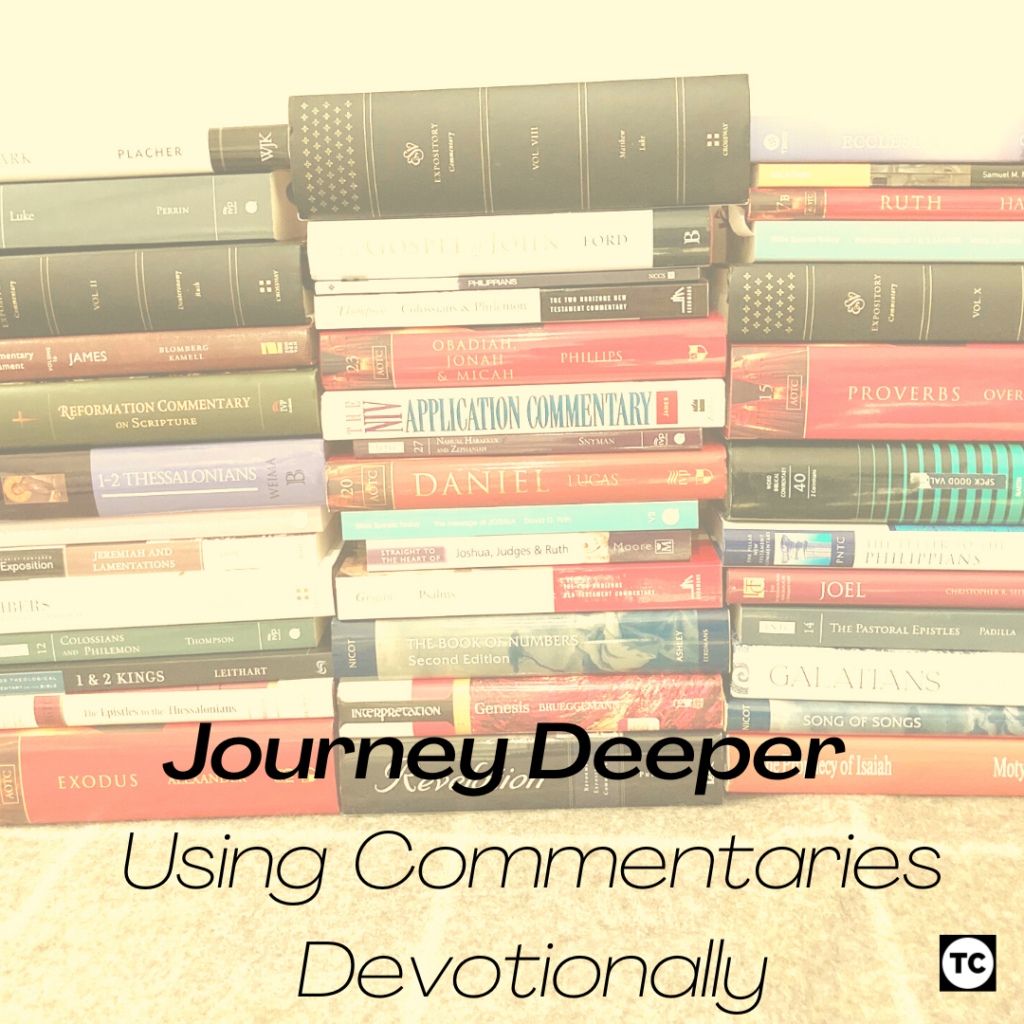I originally wrote this in early January – if you fancied, you could still probably order and catch up with the progress of a 365 Daily Devotional like Food for the Journey or Journey With Me – when lots of people’s New Years Resolutions have come a cropper! Or perhaps, like me, you sketch some broad goals for the year (here are my reading goals). Regardless of when in the year you are reading this post, I think there’s no time like the present to think about how we are doing and what sorts of habits we are forming.

One of the most powerful habits that the Lord has helped me sustain in recent years – after some patchy consistency, to say the least – has been that of a daily quiet time. As part of refreshing and renewing the practice, I’ve made a surprising discovery – commentaries can help!
My practice is quite simple
- 5-10 minutes of prayer, often using the PrayerMate App
- A few moments of silence and self-reflection, sometimes I write a little bit.
- A reading from a 365 Daily Devotional – to make sure, even on a busy day, I read from God’s Word
- A reading from a book of the Bible that I’m studying – and the relevant passage/sections from a commentary. I’ve used commentaries from around 15 different series (I’m a nerd and a book collector!) but have zeroed in particularly on the Tyndale Commentaries from IVP as striking a perfect balance between detail and brevity. (I would say that – I look after them. For more about reading commentaries cover to cover, see this blog post)
- Pray to close, asking God to help me remember what I’ve seen of Him in His word, and let it impact my life.
I’m sure many reading this will spend more time praying, or spend longer reading the Bible, or integrate other disciplines and practices. When I’ve told people that I’ve started to use commentaries in my devotional time, I’ve had basically to responses: either, ‘nerd’, or, ‘oh, that sounds interesting, how do you do it?’. It is with the latter group in mind that I offer the following tips and thoughts for using commentaries in your devotional time:
- Have a Bible alongside. Ideally it should be the same translation as the commentary you are using. For example, the Bible Speaks Today volumes (Old and New Testament) have been or are being updated to use the NIV, which is the same as the BST NIV Study Bible. That’s a pretty good pairing!
- Try roughly a ten page chunk. Even the largest book can be read in ten-page-chunks! That way the average commentary from the Tyndale or BST families will take about a month – and usually that fits well with the length of a passage that is manageable in a devotional time. If that feels manageable, try increasing it – on a relaxed Sunday when someone else is looking after my toddlers, I might manage 100 pages of a readable commentary, on a busy work day it might be none, and I’ll catch up in the evening.
- Have a notebook or other method for noting down the gold. Over Christmas I thoroughly enjoyed Eckhard Schnabel’s commentary on Mark – reading about the life, ministry and death of Jesus around the celebration of his birth was moving and meaningful. There were lots of nuggets I wanted to note down! In that particular case I read the kindle edition, and so just highlighted things – other books I’ve manually written out quotes. The latter is probably better, and fits with the flow of prayer and reflection I outlined earlier.
- Understand what you are letting yourself in for! If you’ve never used a commentary before, or not in this way, then the Bible Speaks Today series or the New Bible Commentary might be a good place to start. If you are a bit bolder, then the IVP New Testament Commentary series, or the TNTC/TOTC series could be perfect – I’d say the Tyndales in particular catch a good balance between brevity and depth, teaching the reader without drowning in detail or assuming too much prior knowledge! If you are feeling really brave, and are either capable of reading or willing to tolerate some Hebrew, then the Apollos Old Testament Commentary Series or even some of the NSBT series might be worth a look.
- Feel free to put the book down and read something else. I think we all do different ‘types’ of reading, whether we know it or not – and if a commentary is making you argumentative and focusing your mind on the human author rather than what God is saying, it might not be the best devotional aid for you and that is absolutely fine. Commentaries are designed as reference works, largely, so shop around to find one that resonates with you. (Again, see my other blog post about reading commentaries for more on this)
Ever since I was a student I’ve been on a journey of seeing the work that authors and schoalrs put into writing books. I’m privileged now to be involved in the editorial process for some of the series above – and seeing the heart and mind of the men and women who study and mine the Scriptures, I’m not at all surprised when a devotional reading reveals fresh angles or deep beauty about who God is and what He has done. Using commentaries devotionally won’t be for everyone – we’ve got plenty of devotional books available, too – but why not give it a go at some point in the future?
Leave a Reply